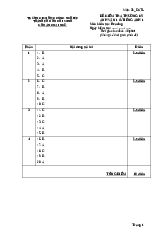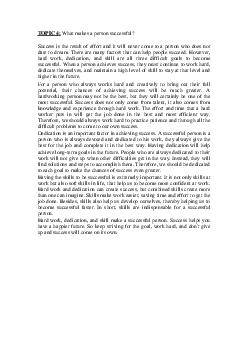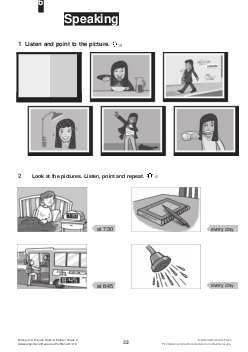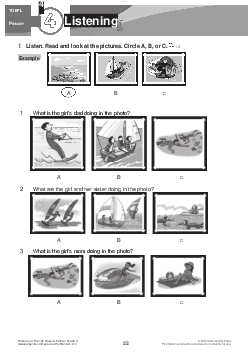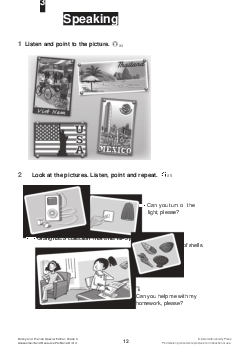


Preview text:
REPORTED SPEECH I- STATEMENTS
- John says “The company I work for is going to open a new o昀케ce next month”.
John says (to me) that the company he works for is going to open a new o昀케ce the following month. -
“I went to this park with my family yesterday”, said Mary.
Mary told me that she had gone to that park with her family the day before. II- WH_QUESTIONS
The teacher said “How long does it often take you to travel to school every day, students?”
The teacher asked her students how long it often took them to travel to school every day. III- YES/NO QUESTIONS
My police said “Do you remember anything about what happened before the 昀椀re?”
The police asked me if/whether I remembered anything about what had happened before the 昀椀re. IV- REQUESTS
The clerk said “Can you show me your identi昀椀cation card with a photo?”
“Please show me your identi昀椀cation card with a photo?”
“Why don’t you show me your identi昀椀cation card with a photo?”
The clerk asked me to show her my identi昀椀cation card with a photo.
V. FORMAL AND INFORMAL FORMS OF REPORTED SPEECH
Peter suggested (that) we (should) go to the cinema on the weekend. (Formal)
Peter suggested going to the cinema on the weekend. (Informal) lOMoAR cPSD| 39651089 VI – CHANGES REPORTED REPORTED DIRECT SPEECH DIRECT SPEECH SPEECH SPEECH Simple Present Simple Past now then Present Continuous Past Continuous today, tonight that day, that night Simple Future WOULD + Bare Inf ago before (WILL + Bare Inf) Simple Past, the day before, Past Perfect yesterday Present Perfect the previous day Past Continuous Past Perfect the next day, Present Perfect tomorrow Continuous the following day Continuous Depending on the I, me, my, mine this that speakers Depending on the You, your, yours these those listeners may might must had to
*** Only change the tense of the sentences if the verbs in the main clause are in past tense. -
“I went to this park with my family yesterday”, said Mary.
Mary told me (that) she had gone to that park with her family the day before. -
“I went to this park with my family yesterday”, says Mary.
Mary tells me (that) she went to that park with her family the day before.
*** Don’t change the tense of the sentence,
1. If it is a conditional sentence type 2 or 3 -
He said: “If I knew her address, I would write to her”
He said (that) he would write to her If he knew her address. -
The teacher said: “If John had studied harder, he wouldn’t have failed his exam.”
The teacher said (that) if John had studied harder, he wouldn’t have failed his exam. lOMoAR cPSD| 39651089
2. If it is a fact / truth -
He said, “My father always drinks co昀昀ee after dinner”
He said (that) his father always drinks co昀昀ee after dinner. -
My teacher said “The sun rises in the East”
My teacher said (that) the sun rises in the East.
3. If the time in the noun clause has not passed He said
“I will come to your house tomorrow”
He said (that) he will come to my house tomorrow.
4. If the verbs in the noun clauses are modal verbs SHOULD, OUGHT TO, COULD, MIGHT…
She said “You should ask your teacher to expand the deadline.”
She said (that) I should ask my teacher to expand the deadline.
5. With WISH, WOULD RATHER, WOULD SOONER, IT’S (HIGH/ABOUT) TIME -
He said “I wish I had a lot of money” He
wishes (that) he had a lot of money. -
She said “I would rather you stayed at home”.
She said (that) she would rather me stayed at hone. -
She said “It’s about time you went to bed; children”
She told her children that it’s about time they went to bed
VII- Passive Voice in Reported Speech
- People say the man will certainly win the prize. It is said
that the man will certainly win the prize. The man is said to
certainly win the prize.
The prize is said to certainly be won by the man. -
They say I have to pay 20 more dollars. It is
said that I have to pay 20 more dollars. I am said
to have to pay 20 more dollars.
20 more dollars is said to have to be paid. -
Somebody says that the man built the house twenty years before. It is said that
the man built the house twenty years before.
The man is said to have built the house twenty years before.
The house is said to have been built by the man twenty years before. lOMoAR cPSD| 39651089
VIII- INDIRECT QUESTIONS -
What is he doing in his o昀케ce?
I want to know what he is doing in his o昀케ce. -
Did she call you last night?
Tell me if/whether she call you last night. -
When will I receive the paycheck?
Can you tell me when I will receive the pay check?

